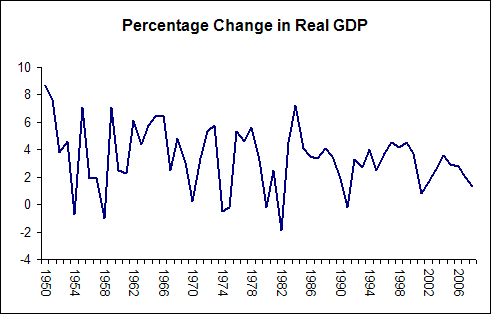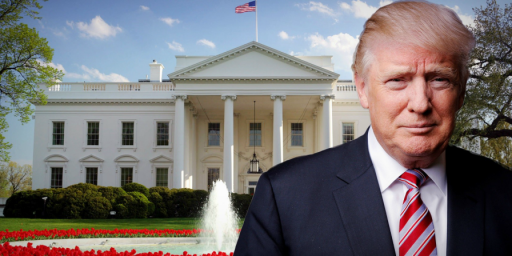The End of 9/11 Politics?
Ben Smith and David Paul Kuhn argue that Rudy Giuliani’s poor showing in this campaign “seems also to mark the beginning of the end of a period in Republican politics that began on Sept. 11, 2001.”
“There’s a paradox for Rudy,” said former Nebraska Sen. Bob Kerrey, who was a member of the 9/11 Commission. “One of the things he did very well on 9/11 was say, ‘We’ve got to get back to normal.’ And that’s what’s happened. We’ve gotten back to normal.”
[…]
“They never made the pivot from success as a leader after 9/11 in New York to the ability to make success as a leader in federal or national government,” said Matt Dowd, the chief strategist for George W. Bush’s 2004 campaign. “They over relied on 9/11. There was no reason to talk about that. It was baked into his DNA. What they had to do was to make the transition from why what he did in the aftermath of 9/11 why that would make him a great leader at the time of any situation.”
Instead, Giuliani managed to do something that would have been unthinkable a few years earlier: He turned 9/11 into a punch line. The late-night television riffs bubbled into prime time during a Democratic debate in October, when Sen. Joe Biden dismissed the former mayor scornfully. “There’s only three things he mentions in a sentence: a noun, a verb and 9/11,” Biden said.
That remains the best line of the campaign to date.
But Dowd is right: It’s not so much that 9/11 has faded from the national consciousness — though it has — but that Giuliani thought hammering audiences over the head with his leadership in the ensuing days was enough.
Ed Morrissey notes that things other than “9/11” factored into Giuliani’s implosion, notably the Bernard Kerik scandal and “a poor decision to stop competing in the early states and allow the media to focus so much on his rivals.” True. Still, Giuliani didn’t do enough to sell himself; much like Fred Thompson, he acted as if simply presenting himself as willing to take the job were enough.
Successful campaigns are generally prospective, not retrospective. History serves as a backdrop of potential to deliver but it’s not enough. It’s all fine and well to tell people what you’ve done in the past but you’ve got to sell them on what you’ll do in the future to win.
via Memeorandum






I think at heart it was a psychological limitation that sunk Rudy. He has never had much of a vision, nor instinct, nor ability to grow very much out of his core identity.
To be a president of the United States, you need to, in some way, resonate with some shared cultural instincts and sentiments of the people at large. Rudy was always a Brooklyn ethnic kid. He actually failed to expand much beyond that even in his mayoralty – managing to alienate so much of the City before 9/11. Without those last few months, he would have been remembered as a divisive figure who never really managed to embody even the spirit of that one city (although embodiing one part of the spirit very well).
He ran away, eventually, from statewide races. Although his cancer diagnosis is the official reason, I remember well that time and the sense that he (like some previous mayors) was never really comfortable with the idea of having to go out and appeal to the folks in the boonies upstate. I dont think he really had much of a sense of how to do that.
He also ran away from primaries in Iowa and elsewhere. No doubt that was hardly a natural or easy place for a NYC mayor to start a campaign, but the same could be said for a mormon MA governor. But Rudy didnt even try. I think he never really could imagine how to go about growing his identity – to try to embrace a larger vision than the one he had.
In the end, the only outreach beyond the tristate area that he felt comfortable with was to go to FL and appeal to the NY retirees.
A narrow divisive man, on the emotional level. It really doesnt matter much what policies he trotted out – in the end the people make decisions on the basis of whether there is some sort of an emotional connection with the candidate. And that type of a connection has to be nurtured by the candidate.
A narrow man, with a take me or leave me attitude. Predictable outcome.
James, the second best line of the campaign to date was also about Rudy.
“A small man in search of a balcony”.
Right there, in those two lines, is why Rudy failed.
Regards, C
I was quite fond of Rudy. I liked the simplicity. The lack of forced politic. And I felt safe in a very cloudy future. Now?
The Destruction of Rudy G
[Please forgive the rare/solitary blog pimp if you would (tain’t like I have any readers) :-)]
ah yes, Elmo. We see why you dont have so many readers.
The great media conspiracy to pollute our precious bodily fluids and turn us over to the Caliphate.
You do, in the end, point to the heart of why Rudy has imploded. Although it might not be immediate, although we might have moments of weakness, in the end, the great American people will reject a candidacy whose core message is “be afraid, be f**king afraid”.
I find the “9/11 analysis” quite simplistic compared to the one in NRO
Rudy has about as much leadership experience as Obama, and yet Obama is a fave amongst the MSM? What am I missing?
I reject your premise — Rudy has far, far more experience — but I’m not sure it has anything to do with your conclusion. Obama is a fave because he’s charismatic, not because of his resume.
Well Tano, there are readers ….. and then there are readers. As in understanding what is actually written. In your case, the depth of your understanding be measured by micrometer. Commenting with affirmation, on that which you have failed to understand? Priceless. Lemme know when ya figguritout 🙂
Best Regards